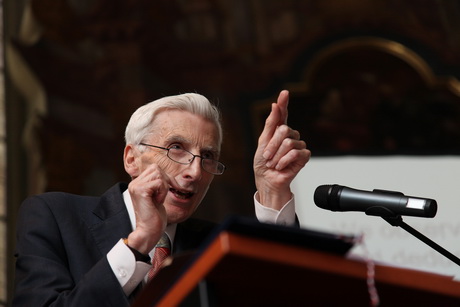Martin Rees is Master of Trinity College and Emeritus Professor of Cosmology and Astrophysics at the University of Cambridge. He holds the honorary title of Astronomer Royal and also Visiting Professor at Imperial College London and at Leicester University. After studying at the University of Cambridge, he held post-doctoral positions in the UK and the USA, before becoming a professor at Sussex University. In 1973, he became a fellow of King's College and Plumian Professor of Astronomy and Experimental Philosophy at Cambridge (continuing in the latter post until 1991) and served for ten years as director of Cambridge's Institute of Astronomy. From 1992 to 2003 he was a Royal Society Research Professor.

Foto: Stanislava Kyselová, Akademický bulletin
The expansion is now dominated by a mysterious 'cosmic repulsion' which dominates the effect of gravity and leads to an acceleration. If the repulsive force stays constant, it will become ever more dominant as the expansion proceeds (and the matter becomes even more diluted). The simplest hypothesis is that the expansion will continue for ever. But long-range forecasts should never be taken too seriously, and it's possible that the repulsive force changes its strength, or even reverses its sign, in the far future. I don't think we'll understand this force until we have a theory that explains the bedrock nature of space and time, and reconciles Einstein's ideas with quantum theory.
In 1982 a research team led by physicist Alain Aspect did remarkable experiment at the University of Paris. He discovered that under certain circumstances subatomic particles such as electrons are able to instantaneously communicate with each other regardless of the distance separating them. University of London physicist David Bohm, for example, believes Aspect's findings imply that objective reality does not exist, that despite its apparent solidity the universe is at heart a phantasm, a gigantic and splendidly detailed hologram. Even the Stanford neurophysiologist Karl Pribram, one of the architects of our modern understanding-of-the brain believes that the universe itself may be a giant hologram?
I'm not really very expert on these quasi-philosophical issues. All I'd say is that we probably haven't yet developed the clearest conceptual framework for quantum phenomena, and we should be openminded about possible surprises. I think the key breakthroughs will come in future, as they have over the last 50 years, from exceptional physicists, and not from philosophers.
Darwin was clearly one of the greatest scientists of any age. His ideas are as lively today as they ever were, and have pervaded our culture. (He was also - unlike Newton, for instance - an attractive and admirable personality whose letters and diaries are of great interest.
Darwin would have been amazed by the advances we've made in understanding the universe. He'd have been fascinated about whether there was life beyond the earth, and how it had evolved. But as science advances, there are always new mysteries that come into focus.
Humans are having a greater imprint on the environment - there are more of us than ever before (7 billion) and we are each consuming more. And technology empowers individuals more than ever. The stakes are therefore getting higher. It's important that scientists engage with the public and with politicians, so that we can benefit from the upside and minimize the risks. I have discussed these issues further in my latest book "From here to infinity - scientific horizons".
I am (unlike John Polkinghorne) not a religious believer
Famous and celebrated physicists as Dirac, Shrodinger, Eddington and even Einstein at the end of their lives tend to fall back on Eastern philosophies, where they were looking for answers on the existential questions as Who am I? Why am I here? The science wasn't able to give them a sufficient answer. Where do you look for peace?
I think we can take great satisfaction in science, but it must be complemented by the arts, and cannot in itself provide ethical values.
During your lecture in Prague you mentioned that you are working on a new book. Could you outline for readers its content?
I mentioned earlier my book, just published, called 'From here to infinity = scientific horizons'. I am working on another called 'What we still don't know' which will address, among other things, the limits that might be set by the capacity of human brains,
14.9.2011












 English
English
